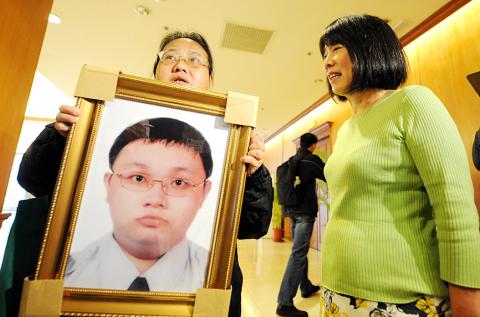Following the death of a young security guard, Democratic Progressive Party (DPP) Legislator Huang Sue-ying (黃淑英) yesterday accused the Council of Labor Affairs of ignoring deaths from overwork in industries such as the private security sector.
Huang made the accusations during a press conference, accompanied by the mother of the security guard, surnamed Chiang (姜).
The 29-year-old Chiang had been an employee at a private security firm since 2001. According to the company’s policy, security guards must work 12 hours a day and get one day off every four days. Their total working hours are 288 hours per month, with 73 days of leave each year.

Photo: CNA
Chiang’s mother said her son was under severe stress from long-term overwork and died on Dec. 6 last year from a stroke while at work. She said the company refused to recognize the case as death from overwork and the family has not received any compensation.
Huang said the alleged mistreatment of the security guard was the direct result of an “unreasonable” clause in Article 84-1 of the Labor Standards Act (勞動基準法), which states that workers in certain industries “may arrange their own working hours, regular days off, national holidays and female workers’ night work through other agreements with their employers.”
Private security firms, which are categorized as “monitoring or intermittent jobs,” fall into this category and are taking advantage of this regulatory loophole to exploit workers, Huang said.
In response, the council said that industries and job functions that fall into the category could arrange their own working hours provided the schedule was agreed upon by both parties and that consideration was paid to the wellbeing of workers. The council would nevertheless review the types of industries and job functions that the article applies to, starting with security firms and expanding to other similar work, it said.
The council recently eased restrictions governing compensation for families of workers who die as a result of overwork. The move came after the council faced accusations it was not adequately protecting workers’ rights and turning a blind eye to the growing incidence of overwork-related deaths.
Death from overwork is especially prevalent in the developed economies of East Asia, such as Japan. However, lawmakers and labor groups have highlighted loopholes inherent in labor regulations that they say allow employers to exploit workers.

Alain Robert, known as the "French Spider-Man," praised Alex Honnold as exceptionally well-prepared after the US climber completed a free solo ascent of Taipei 101 yesterday. Robert said Honnold's ascent of the 508m-tall skyscraper in just more than one-and-a-half hours without using safety ropes or equipment was a remarkable achievement. "This is my life," he said in an interview conducted in French, adding that he liked the feeling of being "on the edge of danger." The 63-year-old Frenchman climbed Taipei 101 using ropes in December 2004, taking about four hours to reach the top. On a one-to-10 scale of difficulty, Robert said Taipei 101

Nipah virus infection is to be officially listed as a category 5 notifiable infectious disease in Taiwan in March, while clinical treatment guidelines are being formulated, the Centers for Disease Control (CDC) said yesterday. With Nipah infections being reported in other countries and considering its relatively high fatality rate, the centers on Jan. 16 announced that it would be listed as a notifiable infectious disease to bolster the nation’s systematic early warning system and increase public awareness, the CDC said. Bangladesh reported four fatal cases last year in separate districts, with three linked to raw date palm sap consumption, CDC Epidemic Intelligence

US climber Alex Honnold left Taiwan this morning a day after completing a free-solo ascent of Taipei 101, a feat that drew cheers from onlookers and gained widespread international attention. Honnold yesterday scaled the 101-story skyscraper without a rope or safety harness. The climb — the highest urban free-solo ascent ever attempted — took just more than 90 minutes and was streamed live on Netflix. It was covered by major international news outlets including CNN, the New York Times, the Guardian and the Wall Street Journal. As Honnold prepared to leave Taiwan today, he attracted a crowd when he and his wife, Sanni,

Taiwanese and US defense groups are collaborating to introduce deployable, semi-autonomous manufacturing systems for drones and components in a boost to the nation’s supply chain resilience. Taiwan’s G-Tech Optroelectronics Corp subsidiary GTOC and the US’ Aerkomm Inc on Friday announced an agreement with fellow US-based Firestorm Lab to adopt the latter’s xCell, a technology featuring 3D printers fitted in 6.1m container units. The systems enable aerial platforms and parts to be produced in high volumes from dispersed nodes capable of rapid redeployment, to minimize the risk of enemy strikes and to meet field requirements, they said. Firestorm chief technology officer Ian Muceus said